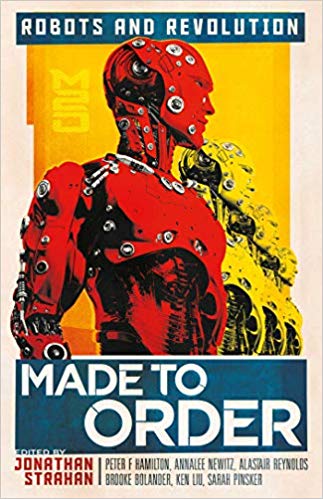Rich Horton Reviews Short Fiction: Made to Order, Edited by Jonathan Strahan, and Anthropocene Rag by Alex Irvine
 Made to Order, Jonathan Strahan, ed. (Solaris) March 2020.
Made to Order, Jonathan Strahan, ed. (Solaris) March 2020.
Anthropocene Rag, Alex Irvine (Tor.com Publishing) March 2020.
I don’t think there can be any doubt that the best currently working original anthologist of science fiction is Jonathan Strahan. (Ellen Datlow probably retains that title for fantasy and certainly for horror.) Strahan’s new anthology is Made to Order, on the subject of robots and mostly their desire for liberation, for autonomy, and while that implies stories about robots righteously overthrowing their masters (us!) – and certainly there are some such – the ways this and similar themes are wielded here are much more varied. I could probably cover all the stories here, but in this space I must limit myself to just a few. The book opens particularly strongly, with two very different but very impressive pieces. Vina JieMin Prasad‘s ”A Guide for Working Breeds” is mostly dialogue between two robots – a veteran mentor and a newly constructed one. The older one, a very reluctant mentor, is named Constant Killer, and, well – you can guess their job. The new one (still looking for a name) gets a job at a café – and finds themself fascinated by dogs. (Enough so that a name they choose is Kleekai Greyhound – and only a little while after reading this story did I realize that Klee Kai is a dog breed, after seeing Bill Belichick’s Klee Kai help him conduct the NFL draft!) This is very funny and very sweet.
Funny might apply to the occasional Peter Watts story, but never sweet, I trust. ”Test4Echo” is neither funny nor sweet, but it’s pretty brilliant, directly exploring the relationship of AIs and us – their creators. Also exploring Saturn’s moon Enceladus! Lange is leading a research project remotely, as a robot probe explores the moon. Their funding is almost up, and then the robot fortuitously sees something quite strange – a sign of life? Or something odd resulting from an injured arm? And why is Lange’s AI assistant, Sansa, so intrigued? The story morphs before our eyes from a cool story of remote exploration to an even cooler – and sadder and scarier – story of… remote exploitation? Thoughtful AF, anyway!
A couple more on the mostly pure fun axis (though not without serious speculation on AI plus economics) are Sarah Pinsker‘s ”Bigger Fish” and Suzanne Palmer‘s ”Chiaroscuro in Red”. Pinsker’s story has Private Investigator James Spendlove looking into the suspicious death of billionaire John Lonsdale III. She learns plenty – about the nasty dealings of the victim, and about the circumstances of his death – alone in an intelligent House with an AI valet… no way anyone could have got to him! The answer is clear – but is it in Spendlove’s interest to reveal it? Palmer tells of a future in which most work is done by robots – humans live on UBI plus, if they’re lucky, proceeds of their shares in robots. Art student Stewart is gifted a soon-to-be redundant robot by his parents… when the robot goes out of service Stewart will be stuck with a worthless hunk of metal – but is it really just a hunk of metal? And can Stewart help it? And, in the long run, what would such help look like? The story is – again – sweet, and I also liked the economic speculation behind it.
The book closes with another dark story, Brooke Bolander‘s ”A Glossary of Radicalization”, which gives some backstory for a character from one of her best stories, ”And You Shall Know Her by the Trail of Dead”. (The two stories can be read completely independently.) Rhye is a biologically based Make (or android, I suppose) who grows up angry, spurred by wondering why she has to be hungry when she doesn’t need to eat. One day, following rumors of a Make who has become rich, she decides to steal from this person, and gets caught… but her captor sees a kindred spirit. This is exciting and passionate and I believed in Rhye and her anger, and the questions she asks make sense and encapsulate, I think, the questions central to this entire book.
Strahan does more than edit anthologies. (He edits these reviews, for one thing!) He also edits novellas for Tor.com Publishing’s exceptional line of slim books. The latest is Anthropocene Rag by Alex Irvine. This is set in the relatively near future, after the Boom – a nanotech outburst of some sort – has taken over much of the country. The Boom, sometimes seemingly at random, absorbs things (including people) and remakes them, sometimes simulating historical events, sometimes just making strangeness. This story follows six people who are each contacted by a ”construct” of the Boom who calls itself Prospector Ed and given a Golden Ticket to Monument Valley, somewhere mysterious in the middle of the country. There they will encounter Moses Barnum, the maker of Monument Valley… to what end? Well, that’s the question – as it’s not just the six people who matter – it’s also Prospector Ed, who is disturbed that he seems to be ”emergent” – gaining independent sentience; and it’s also the narrator, who seems to be part of the Boom – or maybe the Boom collectively – or maybe some other… personage? – and what do they want? This is also a road book of sorts, as our characters travel across this much-changed future US, a US that also reflects our history and the stories we tell about ourselves, and our landscapes. Really strong work.
Recommended Stories
“Glossary of Radicalization”, Brooke Bolander (Made to Order)
Anthropocene Rag, Alex Irvine (Tor.com Publishing)
“Chiaroscuro in Red”, Suzanne Palmer (Made to Order)
“A Guide for Working Breeds”, Vina Jie-Min (Made to Order)
”Test4Echo”, Peter Watts (Made to Order)
Rich Horton works for a major aerospace company in St. Louis MO. He has published over a dozen anthologies, including the yearly series The Year’s Best Science Fiction and Fantasy from Prime Books, and he is the Reprint Editor for Lightspeed Magazine. He contributes articles and reviews on SF and SF history to numerous publications.
This review and more like it in the June 2020 issue of Locus.
 While you are here, please take a moment to support Locus with a one-time or recurring donation. We rely on reader donations to keep the magazine and site going, and would like to keep the site paywall free, but WE NEED YOUR FINANCIAL SUPPORT to continue quality coverage of the science fiction and fantasy field.
While you are here, please take a moment to support Locus with a one-time or recurring donation. We rely on reader donations to keep the magazine and site going, and would like to keep the site paywall free, but WE NEED YOUR FINANCIAL SUPPORT to continue quality coverage of the science fiction and fantasy field.





